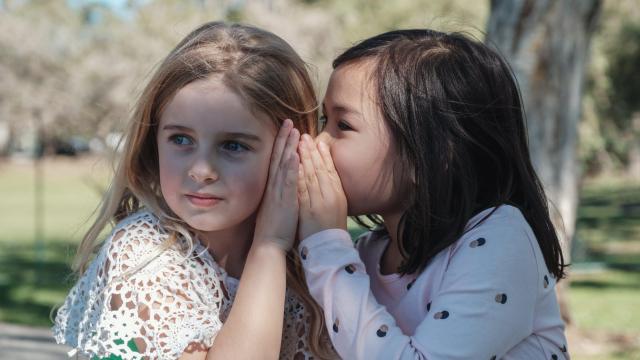As adults, we understand the nuanced differences between a surprise, a secret, and something that is private. But for kids, these concepts can blur and overlap — and unfortunately, that is a fact child predators take advantage of. That’s why it’s important to help define what each concept is and when it’s ok — or not ok — for them to keep certain information to themselves.
Surprises
This is the fun one! A surprise is something that should be fun, happy, and temporary. That might mean surprising Mum with a homemade cake for her birthday or surprising their grandparents with the news that a baby sibling is on its way. It’s a type of secret, but it’s a good secret, because it’s not one that needs to stay secretive forever and it’s intended to create happiness once revealed.
When you’re letting a child in on a surprise, make sure to reiterate that the reason it’s ok to keep this good secret is because they only have to keep quiet about it for a little while and it’s eventually going to make someone they love excited or delighted.
Secrets
Secrets that are meant to be kept for a long time are usually meant to protect someone or keep someone from getting in trouble. Some secrets are relatively harmless, such as a grandparent letting a child eat junk food that you usually don’t allow them to eat. But other secrets can be harmful or dangerous — namely, a child predator telling them they must keep abuse a secret from their parent.
A good way to help them sort out the difference is by talking about safe secrets versus unsafe secrets, in much the same way you probably already talk about safe touches versus unsafe touches. Here’s what Melissa Pintor Carnagey writes for Sex Positive Families:
Let them know that if another person tells them to keep something a secret, especially if the person instructs them not to tell their parents, then it is an unsafe secret and must be shared with a trusted adult. Reassure them that it is always ok for them to break a secret or promise when it involves unsafe touch. Ensure they know that no matter who it involves or how long it has gone on, you will always believe them and do what you can to support their safety.
Privacy
Although we want our kids to be wary of secrets — and especially to come to us when they have an unsafe secret — they also need to learn that some things should be kept private. Privacy isn’t about keeping someone from getting in trouble; it’s about respecting a person’s personal space or information, particularly if that information might be embarrassing. If their brother fails his spelling test, for example, it’s probably not a secret, but telling the neighbours could be embarrassing for him, so it should be kept private.
There are also certain topics or discussions that many families like to keep private, particularly as relating to finances or employment. When you talk about those things within the home, you can reiterate that although it’s not a secret, you do want to keep the information private within the family.
You can start to teach kids about privacy, particularly as it relates to the body, by implementing household rules that ensure everyone in the family has privacy. Those rules will include everyone showering or bathing alone (once they’re old enough), getting dressed in private, and knocking on closed bathroom and bedroom doors and waiting for permission to enter.

Leave a Reply
You must be logged in to post a comment.